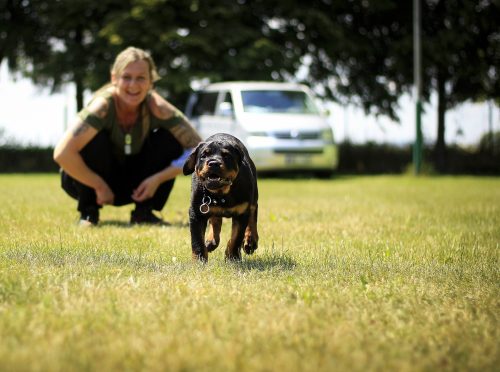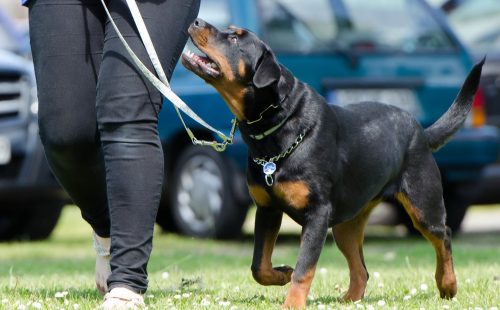Rottweilers are known for their intelligence, companionship, and loyalty, but regardless of a breed’s characteristics, an untrained dog can be an unruly handful. Rottweilers can also be very determined and independent, making thorough training essential.
Even though Rotties are very affectionate and hard working pups, they sometimes get a bad name because untrained Rottweilers can be unsocial and even aggressive if they feel threatened. However, these negative characteristics are completely avoidable with proper Rottweiler training.
Start Training Early

In an ideal situation, you should begin training your Rottweiler when he is a puppy. By beginning training as early as six weeks old, your pup will start to establish good habits before bad ones can form. Training a puppy requires patience, time, dedication, consistency and positive affirmation. Dogs have relatively short-term memories, so unless you catch your dog in the act of doing something bad, reprimanding him at a later time is pointless. For example, if you find an accident in the house, scolding your dog hours or even several minutes later can be fruitless.
This type of training will not get through to your dog, it will only make him fearful of you. On the other hand, if your Rottie starts chasing the cat and you catch him while the action is taking place, you can verbally reprimand your puppy so that it is clear that the cat is not prey. Instead of scolding your dog for undesirable actions, try rewarding him when he exhibits positive actions and behaviors. In addition to verbal praise, you can carry small, low-fat treats with you throughout your training. Rottweilers are often overweight, so be careful with portion size and the type of treat you are giving your puppy.
Stay Consistent
In addition to rewards, Rottweiler puppy training requires consistency. When establishing a feeding and bathroom schedule, it is important that you perform these actions at the same time everyday. At designated times, take your puppy to the same location to do his business in order to establish a routine.
Dogs are creatures of habit, and creating a strict routine is the most effective training method. When your dog goes to the bathroom in the right place at the right time, don’t forget to verbally praise him and give him a tiny treat.

Rottweilers love to be around their people and do not like to be left alone, especially in a confined space. This makes crate training difficult, which is a method many people utilize when they cannot be home to watch their dog.
If possible, someone should be home with your Rottie at all times, especially during this critical training period. The more supervision and company that your pup has, the faster he will master potty training. Like with any playful pup, Rottweiler potty training will require patience; however, with consistency and positive praise, your dog will learn when and where to use the bathroom.
Teaching Your Rottweiler Basic Commands
Although potty training your pup is probably top on your priority list, it is also important to teach your puppy basic commands. Commands such as sit, down, stay, and come can be taught through repetition and rewards.
However, for Rottweilers in particular, socialization is one of the most important elements of training. Most negative thoughts that people have about Rottweilers are that they are aggressive, and unfortunately if left untrained, this is a characteristic that can come true. Rotties have the ability to be extremely loving dogs, but they need socialization with other dogs in order to view new people and pets as friends.
Start socializing your pup as soon as possible by taking him to the dog park, busy public areas such as shopping centers, over to your friends’ houses, have friends over or schedule doggy play dates. The more exposure your dog can get to outside people and pets the better.
Do this as frequently as possible so that your Rottweiler does not view strangers as a threat to himself or to his family. Also, remember that socialization does not end once your dog is no longer a puppy. Continue socialization into adolescence and adulthood to maintain your Rottweiler’s friendly disposition and confidence around strangers.
Training an Adult Rottweiler

Training an older dog is similar to training a puppy, but sometimes requires more patience. Start by gauging your dog’s obedience level. Did the previous owner teach him basic commands and potty training? To gauge socialization, start with on-leash introductions to new people and pets to see how your Rottweiler reacts. Hopefully he was trained previously, but you may need to start at square one. With potty training and commands, follow the same steps as you would with a puppy.
Unfortunately, some bad habits may have already been formed. On the plus side, adult dogs are typically less distracted and hyper than puppies. If your dog was not socialized as a puppy, he may never be completely comfortable around strangers; however, you can teach him not to act aggressively toward them.
After teaching your dog commands such as sit and stay, utilize these around new people to keep your dog calm and under control. Proper on-leash introductions can also aid in socializing your Rottie with new people and pets. Remember that you can teach an old dog new tricks, so practice patience when training your Rottweiler.




